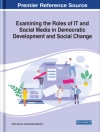Examining the broad contexts of US foreign policy and the lingering aftermath of the Vietnam War, David Ryan argues that these events created an opportunistic framing of 9/11, paving the way for the long-held neo-conservative desire for regime change and war in Iraq.
He examines the construction of the cultural framework for war following 9/11, the legitimacy of military force in Afghanistan, the rise of anti-Americanism, within the broader contexts over the struggle over legitimacy, identity and leadership.
Turning the ‘clash of civilisations’ thesis on its head, Ryan presents a careful analysis of the evolution of US foreign policy and its engagement with Iraq through the 1980s. While 9/11 provided the opportunity, the post-Vietnam context provides a more pertinent framework for this reflection on the Gulf War, the Iraq War and the strategic implications for US foreign policy.
Table des matières
1. Broad Contexts
2. Framing September 11: Rhetorical Device and Photographic Opinion
3. Orientalism and the Anti-American Sentiment
4. War and Just War: Terrorism and Afghanistan
5. The United States and Iraq: ‘One Can do Nothing About the Past’
6. Iraq and Vietnam: The Unbearable Weight of Defeat
7. The Tipping Point: Between Bring ’em on and Going South
8. Imperial Frustrations
Bibliography
Notes
Index
A propos de l’auteur
David Ryan is a Senior Lecturer in the Department of History at University College Cork. He is the author of US Foreign Policy in World History (Routledge, 2000) and Frustrated Empire (Pluto, 2007).












